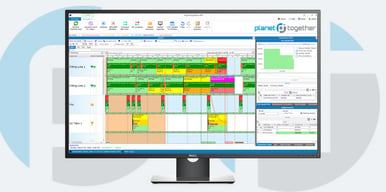Harnessing Augmented Reality for Enhanced Scheduling Visualization in Industrial Manufacturing
Discover how augmented reality revolutionizes scheduling visualization in industrial manufacturing, enhancing efficiency and productivity.
Explore how integrating PlanetTogether with ERP systems enhances metal fabrication scheduling efficiency.
Plant managers in industrial manufacturing facilities are tasked with reducing lead times, minimizing inventory costs, and increasing throughput—all while ensuring high product quality and customer satisfaction.
The challenge is particularly acute in metal fabrication, where the complexity of operations and variability in demand create an intricate balancing act for any manager.
To meet these challenges, digital integration between advanced scheduling software like PlanetTogether and enterprise resource planning (ERP), supply chain management (SCM), and manufacturing execution systems (MES) is essential. Integration with systems such as SAP, Oracle, Microsoft, Kinaxis, and Aveva provides plant managers with comprehensive control and real-time data visibility, making metal fabrication scheduling more efficient and accurate.
In this blog, we will look into the key considerations for optimizing metal fabrication scheduling and explore how integrating PlanetTogether with leading ERP, SCM, and MES systems enhances the scheduling process for better operational outcomes.

Metal fabrication is inherently complex due to a range of variables:
Diverse Product Mix: Different product specifications and designs demand varying raw materials and production steps, creating significant planning challenges.
Equipment Constraints: Limited availability and varying capacity of cutting, bending, welding, and assembly equipment can create bottlenecks.
Material Variability: Fluctuations in material availability and quality can affect scheduling efficiency.
Labor Constraints: Skilled labor is a key component of production and often a limiting factor, especially for specialized tasks.
Customer-Specific Requirements: Customization and last-minute changes in customer orders add further complications.
Lead Times and Inventory Management: Balancing lead times and inventory to meet demand fluctuations while minimizing costs requires precise planning.
These complexities necessitate a highly sophisticated scheduling solution that can not only generate realistic production schedules but also adapt dynamically to changes on the shop floor.

A traditional spreadsheet-based scheduling method is not up to the task of managing the complexity inherent in metal fabrication. This is where advanced scheduling solutions like PlanetTogether shine. With their ability to account for real-time data and constraints, they help plant managers:
Improve Resource Utilization: Ensure optimal use of machines, labor, and materials by dynamically adjusting schedules based on constraints.
Reduce Lead Times: Minimize bottlenecks and adjust to changes quickly, reducing time-to-market for products.
Lower Costs: Reduce overtime, scrap, and rework by aligning resources efficiently.
Boost On-Time Delivery: Fulfill customer orders on time by considering real-world production constraints.
Increase Agility: Adapt to new orders or production changes swiftly and without disrupting existing schedules.

The true potential of scheduling solutions like PlanetTogether is unlocked when they are integrated seamlessly with ERP, SCM, and MES systems. Here's how each type of system contributes to effective scheduling:
ERP (SAP, Oracle, Microsoft Dynamics, etc.):
SCM (Kinaxis, SAP Integrated Business Planning, etc.):
MES (Aveva, Ignition, etc.):

When integrating advanced scheduling solutions like PlanetTogether with ERP, SCM, and MES systems, plant managers should consider the following steps:
Assess Current State
Develop an Integration Strategy
Configure and Test the Integration
Train and Support Staff
Monitor and Optimize
Metal fabrication scheduling is an art and a science that requires plant managers to navigate an ever-shifting landscape of constraints and opportunities. By leveraging advanced scheduling solutions like PlanetTogether in tandem with powerful ERP, SCM, and MES systems, plant managers can gain the insights and agility needed to thrive in this challenging environment.
A comprehensive integration strategy will empower your facility to optimize production schedules, reduce costs, and improve customer satisfaction—positioning your business for sustainable growth.
Whether you're leading a high-volume production plant or a custom fabrication shop, the time to embrace integrated scheduling is now. Are you ready to take your manufacturing operations to the next level? Contact us today to learn more about how PlanetTogether can help you achieve your goals and drive success in your industry.
Discover how augmented reality revolutionizes scheduling visualization in industrial manufacturing, enhancing efficiency and productivity.
Discover how cognitive scheduling assistants empower plant managers in medical manufacturing with optimized production schedules and real-time...
Discover how integrating advanced planning solutions like PlanetTogether with ERP systems can optimize material flow in food and beverage...
Be the first to know about new B2B SaaS Marketing insights to build or refine your marketing function with the tools and knowledge of today’s industry.